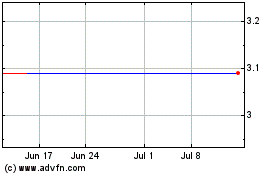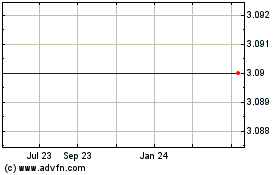U.K. Faces Reckoning Over RBS Bailout
September 28 2016 - 6:45AM
Dow Jones News
By Max Colchester
LONDON--In the weeks after Brexit, U.K. Treasury officials began
to reassess the value of the nation's 73% stake in Royal Bank of
Scotland Group PLC. The market's answer: substantially less than
before.
RBS was saved with GBP45.5 billion ($59 billion) of taxpayer
money in one of Europe's biggest bank bailouts. The value of that
stake has shriveled since the 2008 rescue, and the vote to leave
the European Union has hammered another nail into the coffin for
hopes of a face-saving privatization.
Nearly a third of RBS's market value has been wiped out since
Brexit, more than any other major U.K. bank. The British government
plans to sell GBP25 billion of RBS shares in the next four years.
But that is built on an optimistic assumption, because its entire
RBS stake is currently worth only about GBP15 billion.
Like its peers, RBS's stock was pummeled by a Bank of England
decision to cut interest rates after the EU referendum, looming
fines and worries of a slowing economy. "Few banks have been more
affected by Brexit," says Barrington Pitt Miller, a bank analyst at
Janus Capital.
RBS executives and investors have long argued the bank should be
privately held, but the U.K. Treasury is now swamped by a bigger
problem -- negotiating the actual Brexit. Executives at UK
Financial Investments Ltd., which manages the government's stakes
in the British bailed-out banks, has been in touch with Treasury
officials but have yet to meet the new Chancellor of the Exchequer
Philip Hammond, according to people familiar with the matter. A
plan to sell part of a 9% stake in Lloyds Banking Group PLC is also
on hold.
The Brexit sucker punch landed just as RBS was half way through
a five-year plan to shed several businesses and leave a profitable
U.K. retail and corporate franchise. But that strategy factored in
neither long-term rock-bottom interest rates nor the cost of
reaccelerating restructuring plans. Brexit is likely to trigger
both, and in the process delay proposals for share buybacks or
dividend payments.
In August RBS Chief Executive Ross McEwan warned that hitting
2019 financial targets of a 12% return on equity will "now likely
be more challenging" and said plans will be presented in February
to slice more cost out the business. During a radio show the New
Zealander said that Brexit could push the bank's privatization back
another two years.
The post-Brexit cut to U.K. interest rates is pinching RBS's
profits, yet the bank can't pass on the full scale of the rate cut
as many of its depositors are companies who are already being paid
no interest. Mr. McEwan blamed lower rates for the collapse of a
GBP1.5 billion plan to float over 300 branches which must be shed
as a condition of RBS's bailout. On Tuesday he warned RBS may not
be able to meet the 2017 deadline for the sale, raising the
prospect of a fine.
RBS's headquarters are in Scotland, which has threatened to
leave the U.K. if Brexit happens. Relocating to England will be
expensive, analysts say. RBS also has a bank in Ireland, whose
economy is expected to be disproportionately hit by a U.K. exit
from the EU.
Litigation is another risk. On Tuesday RBS agreed to pay $1.1
billion to a U.S. regulator to resolve two civil lawsuits over the
way it sold mortgage-backed securities in the run-up to the
financial crisis. Discussions to settle with two other agencies,
including the Justice Department, are under way. The penalties
could top the $5.6 billion the bank has so far put aside.
RBS's shares are down 42% for the year and 30% since Brexit. Its
balance sheet has been cut by more than a trillion pounds since its
bailout, which partly explains the collapse.
For years, RBS's privatization was on the front-line of a
political brawl which sucked in parties ranging from the prime
minister to the archbishop of Canterbury. The government eventually
urged RBS to ditch its international and investment banking
operations to focus on the U.K.
Some analysts say the government should accept a big loss and
move on. The Treasury bought RBS shares at an average price of
GBP5--they now trade at GBP1.77. "I can plug any number into my
models and I will never get to GBP5," says Chirantan Barua, an
analyst at Bernstein Research.
In November the U.K.'s Office of Budget Responsibility may slash
how much the government can expect to get from RBS share sales.
This could push up the country's predicted net debt levels.
Meanwhile RBS is launching a rebranding exercise. A
black-and-white TV ad to be aired during prime-time, shows people
committing good and bad deeds. "We are what we do," the ad's
tagline says.
Write to Max Colchester at max.colchester@wsj.com
(END) Dow Jones Newswires
September 28, 2016 06:30 ET (10:30 GMT)
Copyright (c) 2016 Dow Jones & Company, Inc.
Royal Bank of Scotland (NYSE:RBS)
Historical Stock Chart
From Mar 2024 to Apr 2024

Royal Bank of Scotland (NYSE:RBS)
Historical Stock Chart
From Apr 2023 to Apr 2024
